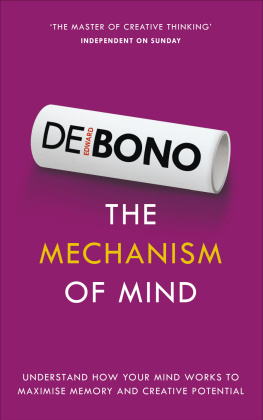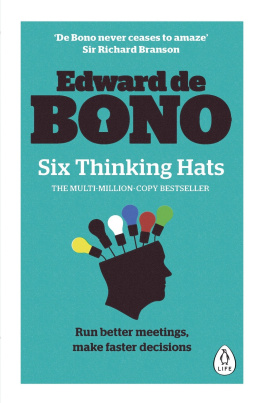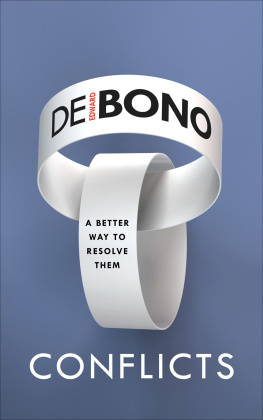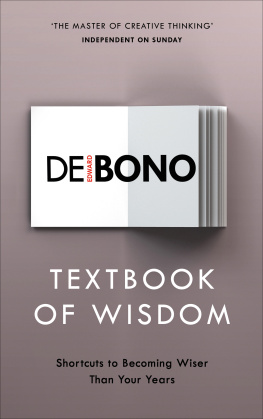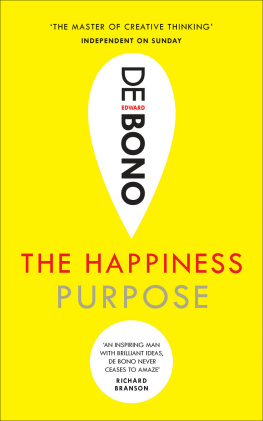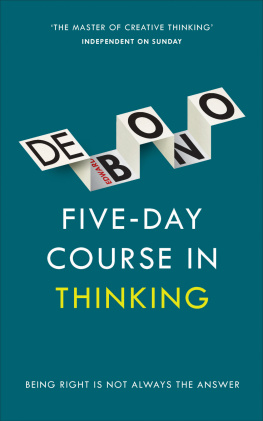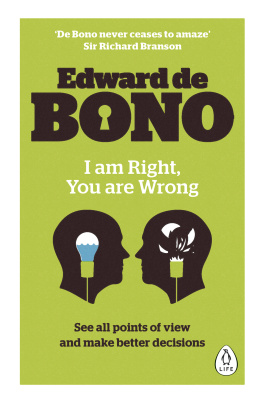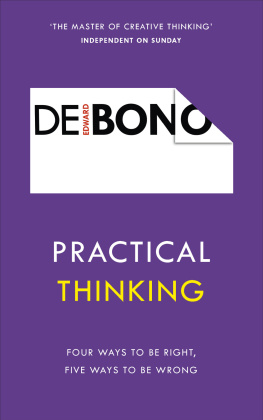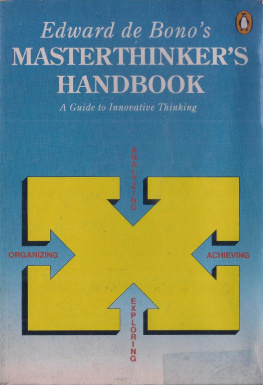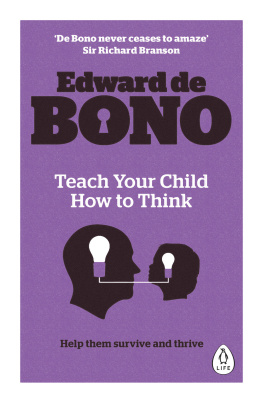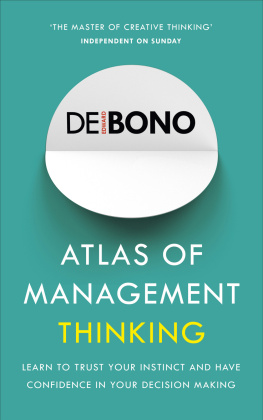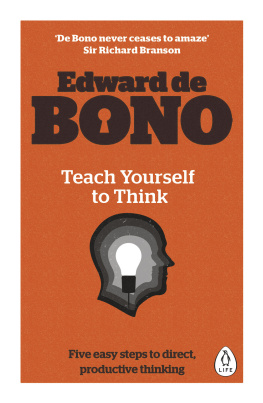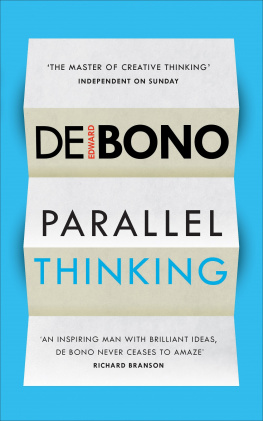Edward de Bono - Parallel thinking: from Socratic to de Bono thinking
Here you can read online Edward de Bono - Parallel thinking: from Socratic to de Bono thinking full text of the book (entire story) in english for free. Download pdf and epub, get meaning, cover and reviews about this ebook. publisher: Ebury Publishing, genre: Politics. Description of the work, (preface) as well as reviews are available. Best literature library LitArk.com created for fans of good reading and offers a wide selection of genres:
Romance novel
Science fiction
Adventure
Detective
Science
History
Home and family
Prose
Art
Politics
Computer
Non-fiction
Religion
Business
Children
Humor
Choose a favorite category and find really read worthwhile books. Enjoy immersion in the world of imagination, feel the emotions of the characters or learn something new for yourself, make an fascinating discovery.

- Book:Parallel thinking: from Socratic to de Bono thinking
- Author:
- Publisher:Ebury Publishing
- Genre:
- Rating:5 / 5
- Favourites:Add to favourites
- Your mark:
- 100
- 1
- 2
- 3
- 4
- 5
Parallel thinking: from Socratic to de Bono thinking: summary, description and annotation
We offer to read an annotation, description, summary or preface (depends on what the author of the book "Parallel thinking: from Socratic to de Bono thinking" wrote himself). If you haven't found the necessary information about the book — write in the comments, we will try to find it.
Parallel thinking: from Socratic to de Bono thinking — read online for free the complete book (whole text) full work
Below is the text of the book, divided by pages. System saving the place of the last page read, allows you to conveniently read the book "Parallel thinking: from Socratic to de Bono thinking" online for free, without having to search again every time where you left off. Put a bookmark, and you can go to the page where you finished reading at any time.
Font size:
Interval:
Bookmark:
IN PRAISE OF EDWARD DE BONO
'Edward doesn't just think. He is a one-man global industry, whose work is gospel in government, universities, schools, corporates and even prisons all over the world' Times 2
'Edward de Bono is a toolmaker, his tools have been fashioned for thinking, to make more of the mind' Peter Gabriel
'De Bono's work may be the best thing going in the world today' George Gallup, originator of the Gallup Poll
'The guru of clear thinking' Marketing Week
PRAISE FOR HOW TO HAVE A BEAUTIFUL MIND
'Mercifully free of the trite techniques offered by many publications promising to save us from social awkwardness, the book succeeds in doing just that' Independent on Sunday
'a clever, instructive guide... Highly recommended' The Good Book Guide
PRAISE FOR HOW TO HAVE CREATIVE IDEAS
'Good fun, stimulating good thinking' Times Educational Supplement
'A thought-provoking and thought-improving book... Simple, practical and great fun' Management Today
'It is simple, practical and fun and a necessary read for anyone who wants to have great ideas' Business Executive
Also by Edward de Bono from Vermilion:
How to Have a Beautiful Mind
The Six Value Medals
H+ (Plus) A New Religion?
How to Have Creative Ideas
Six Frames for Thinking about Information
This eBook is copyright material and must not be copied, reproduced, transferred, distributed, leased, licensed or publicly performed or used in any way except as specifically permitted in writing by the publishers, as allowed under the terms and conditions under which it was purchased or as strictly permitted by applicable copyright law. Any unauthorised distribution or use of this text may be a direct infringement of the author's and publisher's rights and those responsible may be liable in law accordingly.
ISBN 9781407028699
Version 1.0
www.randomhouse.co.uk
1 3 5 7 9 10 8 6 4 2
Published in 2009 by Vermilion, an imprint of Ebury Publishing
Ebury Publishing is a Random House Group company
Copyright The McQuaig Group Inc. 2009
Edward de Bono has asserted his moral right to be identified as theauthor of this Work in accordance with the Copyright, Design andPatents Act 1988.
This electronic book is sold subject to the condition that it shall not by way of trade or otherwise, be lent, resold, hired out, or otherwise circulated without the publisher's prior consent in any form other than that in which it is published and without a similar condition including this condition being imposed on the subsequent purchaser
The Random House Group Limited Reg. No. 954009
Addresses for companies within the Random House Group can be found at
www.rbooks.co.uk
A CIP catalogue record for this book is available from the British Library
ISBN: 9781407028699
Version 1.0
Copies are available at special rates for bulk orders. Contact the sales development team on 020 7840 8487 for more information.
To buy books by your favourite authors and register for offers, visit www.rbooks.co.uk
Apologies
There are a number of people whose names should be in this book. They have told me certain things, or done certain things, and I would like to acknowledge their contribution. Unfortunately I do not keep detailed records of all meetings and conversations. So I apologise to anyone who feels they should have been mentioned. Please write to me and indicate where and why your name should be included, and in the next edition of the book I shall see that your name is there.
In addition, if you have practical experience with my thinking in your own life or business, or in teaching the methods, and it is not included here, let me have details and, if appropriate, I will include them in the next edition.
Any omission of a name is unintentional and I apologise for it. I do want to give full credit to those who have helped me in my work.
WHY DO WE NEED THIS BOOK?
This is not a nice book. It is not intended to be a nice book. You cannot shift complacency with niceness. We are completely complacent about the quality of our human thinking. We believe it to be wonderful for various reasons that I shall discuss later. We have done nothing about human thinking, outside of mathematics, for roughly 2,400 years, since the great Greek philosophers. I do not believe we should be so complacent. This book is about why human thinking is so poor. It also suggests what we can do about it. So it is a positive book even if the need for such a book is negative.
I come from the island of Malta, which is officially the oldest civilisation in the world. The earliest man-made structure on earth is a substantial Stone Age temple in Gozo (the sister island of Malta). So perhaps I have a mission to save the world from its complacency.
Think grey not green
It has become very fashionable to 'think green', and I am fully in favour of this. Climate change is a legitimate political theme, and any politician can express his or her concern with this matter and get votes as a result. This is excellent.
But there is a bigger and more urgent danger than climate change. That danger is the poor quality of human thinking. This requires even more urgent attention. Perhaps there should be an even more important slogan 'think grey'. The grey refers to our grey matter, or brains. Most of the problems, conflicts and fights in the world are caused by poor thinking. An improvement in human thinking would help solve such issues. If we get our thinking right then it becomes easier to solve not only environmental problems, but other problems too.
Consider the Israel / Palestine problem. Here we have some of the most intelligent people on the surface of the earth. For over 60 years they have been unable to solve their problem, and yet they know full well that it has to be solved some time. That is poor thinking.
Nothing is more fundamental or more important than human thinking. What about values? The purpose of thinking is to enable us to deliver and enjoy our values. Values without thinking are highly dangerous and have been responsible for the wars, pogroms, persecutions and appalling behaviour of the past. Thinking without values is pointless for thinking then has no purpose.
Yet, amazingly, we have paid no attention to thinking for 2,400 years.
Emotion vs. thought
What about emotions? What about human behaviour? What about human nature?
There is a belief that thinking is academic and abstract and that what really drives action is human emotions and human behaviour. This is unfortunate nonsense that arises directly and correctly from our traditional methods of thinking, which have very little practical impact in conflict situations.
In the Karee platinum mine in South Africa there were seven tribes represented among the workers: Xhosa, Zulu, Sutu, and so on. As a consequence of the traditional hostilities between these tribes, developed over centuries, there were 210 fights every month between members of the various tribes. Susan Mackie and Donalda Dawson taught my perceptual thinking to these totally illiterate miners who had never been to school for even one day in their lives. They encouraged them to consider other people's points of view. The result was that the fights dropped from 210 a month to just four! Why had better thinking made this huge difference? Because this new thinking was concerned with perception not logic.
Logic will never change emotions and behaviour. Trying to persuade people logically to change emotions is useless in practice, and most people have experienced this. It isperceptions that control emotions and emotions control behaviour. Changes in perception will change emotions and therefore behaviour. If your perception changes, you have no choice: your emotions and behaviour change too.
Font size:
Interval:
Bookmark:
Similar books «Parallel thinking: from Socratic to de Bono thinking»
Look at similar books to Parallel thinking: from Socratic to de Bono thinking. We have selected literature similar in name and meaning in the hope of providing readers with more options to find new, interesting, not yet read works.
Discussion, reviews of the book Parallel thinking: from Socratic to de Bono thinking and just readers' own opinions. Leave your comments, write what you think about the work, its meaning or the main characters. Specify what exactly you liked and what you didn't like, and why you think so.

